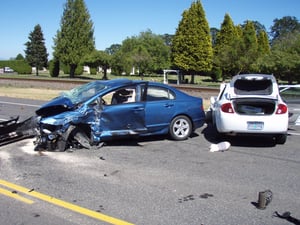Motor vehicle accidents can be horrific experiences no matter the severity of the damage or injuries.
Everyone reacts differently to an automobile crash. From extremely severe crashes to slight fender-benders, there is still a great amount of force when two vehicles collide with one another.
When individuals are involved in a minor car accident, they usually do not notice their symptoms immediately following the wreck. This can happen for many reasons, but the most common is because of the release of adrenaline.
If you've been in a car accident, it's crucial to see the best car accident chiropractor for a medical evaluation.
The generation of adrenaline and endorphins, two chemicals that supercharge our bodies, are responsible for blocking pain and helping us cope with the situation at the time of the accident.
So keep in mind that even if you feel fine immediately following your car crash, that doesn't necessarily mean that you are fine. When the release of adrenaline and endorphins finally subsides, common symptoms of injury can quickly start to set in.
Our goal is to help you understand the importance of monitoring your symptoms and treating your injuries following a car accident. We not only want to help you restore your physical well-being but also help you protect your legal rights and receive the compensation you deserve for your injuries.
Below is a list of common car accident injuries that may not present delayed injury symptoms.
Table of Contents
Delayed Car Accident Injury Symptoms
- Headaches and Migraines
- Abdominal Pain and Swelling
- Numbness and Tingling
- Neck and Back Pain
- Bruising or Swelling
- Reduced Range of Motion
- Why It's Important Not to Ignore Delayed Symptoms
- What to do if you Experience Delayed Symptoms
- See a Doctor After the Accident Regardless of Present Symptoms
DELAYED CAR ACCIDENT INJURY SYMPTOMS
Headaches or Migraines
It is typical to get headaches following an automobile accident. While headaches are typically not harmful and resolve on their own, they can also indicate more serious issues, such as:
- Concussions
- Neck or back injuries
- Traumatic brain injuries
If you experience persistent or severe headaches after a car accident, it's essential to seek medical attention to rule out more serious injuries.
Abdominal Pain and Swelling
Internal injuries, such as internal organ damage, blood clots, and internal bleeding, may not be immediately apparent after a car accident.
Symptoms of these hidden injuries to watch out for include:
- Abdominal pain and tenderness
- Swelling or bruising around the abdomen
- Nausea and vomiting
- Dizziness, lightheadedness, or blurred vision
Internal injuries can be life-threatening if not treated promptly, so it's crucial to seek immediate medical care if you experience these symptoms.
Numbness or Tingling
Numbness or tingling in the extremities can be a sign of nerve damage or a spinal injury.
These symptoms may not appear until days or weeks after the accident and can include:
- Numbness or tingling in the arms, hands, legs, or feet
- Weakness in the affected area
- Shooting pain that radiates down the arms or legs
Neck and Back Pain
One of the most common delayed symptoms after a car accident is neck and back pain.
Whiplash injuries, which occur when the head is suddenly jerked forward and then snapped back, are a prevalent injury in rear-end collisions.
Symptoms of whiplash can include:
- Neck pain and stiffness
- Reduced range of motion in the neck
- Headaches, often starting at the base of the skull
- Shoulder pain and upper back pain
Bruising or Swelling
Delayed bruising and swelling can indicate broken bones, hematomas, and other traumatic injuries. Again, if you experience any of these delayed symptoms, you should contact a doctor right away.
Reduced Range of Motion
Following a traumatic injury, common delayed symptoms include reduced movement and range of motion. If you have reduced range of motion in your back, shoulders, arms, hands, legs, or feet, it is most likely due to soft tissue damage such as a muscle strain, sprain, or tear.
Soft tissue injuries usually cause pain, a lack of range of mobility, and swelling. However, these symptoms will most likely not appear immediately. Whether your accident occurred at a low or high rate of speed, it probably generated a lot of force, and it could potentially take days or weeks to produce symptoms of an injury that you sustained.
Want more information about potential injuries resulting from a car accident? Click here to read our blog post, Most Common Injuries Associated With Rear-End Car Accidents
Why It's Important Not to Ignore Delayed Symptoms
Ignoring delayed car accident injury symptoms can have serious consequences.
Untreated injuries can worsen over time, leading to chronic pain, mobility issues, and other long-term health problems.
Additionally, delaying medical treatment can negatively impact your ability to file an insurance claim or pursue legal action against the at-fault driver.
What to Do If You Experience Delayed Symptoms
If you experience any delayed car accident injury symptoms, it's essential to take the following steps:
-
Seek Medical Attention: Even if your symptoms appear minor, it's crucial to see a doctor for a thorough evaluation. A medical professional can diagnose your injuries and recommend an appropriate treatment plan to help prevent any long-term damage.
-
Document Your Injuries: Keep detailed records of your symptoms, medical treatments, and any related expenses. This information will be valuable if you need to file an insurance claim or pursue a personal injury lawsuit.
-
Consult with a Personal Injury Lawyer: If you've been injured in a car accident due to someone else's negligence, you may be entitled to compensation for your medical expenses, lost wages, pain and suffering, and other damages. Accident victims should consult with an experienced personal injury attorney who can help them understand their legal rights and will pursue fair compensation during the accident claim.
SEE A DOCTOR AFTER THE ACCIDENT REGARDLESS OF PRESENT SYMPTOMS
We recommend that accident victims seek medical attention from a doctor or chiropractor following an auto accident, regardless of present symptoms or physical injuries.
Your doctor should be able to diagnose any injuries you sustained in the accident before they become too serious.
If there are no noticeable injuries, your doctor can advise you on how to monitor potential injuries and symptoms and what to look out for.
It is also imperative you see a doctor after your accident if you plan on filing a personal injury claim.
Insurance adjusters will require a documented account of your doctor visits to prove that you were indeed injured from the accident.
Also, keep in mind that if you wait too long to see a doctor or chiropractor about your injuries, your insurance company will most likely deny your claim, stating that because you waited so long, you could not have been all that injured.
So, if you or a loved one has been involved in an accident and is experiencing any symptoms of injury or pain, call the expert car accident doctors at Arrowhead Chiropractic Clinic today!
Read our previous blog: How you can Take Care of Your Back Pain After a Car Accident



